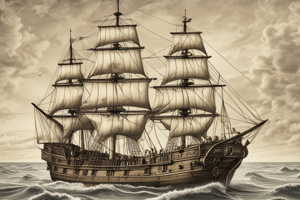Podcast
Questions and Answers
How did the Portuguese explore?
How did the Portuguese explore?
The Portuguese explored by developing advanced navigational techniques, mapping coastlines, and establishing sea routes to Asia and Africa.
What did Columbus do and write?
What did Columbus do and write?
Columbus sailed across the Atlantic in 1492 to reach the Americas, and he wrote about his discoveries in letters to the Spanish royalty.
What role did the pope play in exploration?
What role did the pope play in exploration?
The pope played a role in exploration by granting territories to different countries through papal bulls, notably the Treaty of Tordesillas which divided the New World between Spain and Portugal.
How did Cortes deal with the Aztecs?
How did Cortes deal with the Aztecs?
What did Martin Luther argue?
What did Martin Luther argue?
What did John Calvin argue?
What did John Calvin argue?
What happened to religion in England?
What happened to religion in England?
What religious intolerance was seen in France?
What religious intolerance was seen in France?
Study Notes
Portuguese Exploration
- Used advanced sailing techniques and caravels for expeditions.
- Explored the African coast and established trade routes for spices and other resources.
- This exploration led to the discovery of new trade routes and expansion of overseas territories.
Christopher Columbus
- An Italian explorer who sailed for Spain.
- Discovered the Americas in 1492, believing he had reached Asia.
- Wrote accounts of his journeys, contributing to the understanding of the new world.
The Pope's Role in Exploration
- The Pope played a significant role in dividing the world between Spain and Portugal in the Treaty of Tordesillas in 1494.
- The Treaty aimed to avoid potential conflict between the two countries by establishing clear zones of control.
Cortes and the Aztecs
- Cortes was a Spanish conquistador who led the conquest of the Aztec Empire in the 16th century.
- He used superior weaponry and military tactics to defeat the Aztecs.
- Cortes' conquest led to the subjugation of the Aztec people and the beginning of Spanish colonization in Mexico.
Martin Luther
- A German monk who challenged the authority of the Catholic Church in the 16th century.
- Argued that salvation is achieved through faith alone, not through good works.
- His ideas led to the Protestant Reformation, a major schism within Christianity.
John Calvin
- A French theologian who further developed Protestant doctrines in the 16th century.
- Emphasized God's absolute sovereignty and predestination.
- His teachings heavily influenced Protestantism in France, Scotland, and England.
Religion in England
- King Henry VIII broke away from the Catholic Church and established the Church of England in the 16th century.
- This break occurred due to Henry's desire for a male heir and his desire for a divorce.
- The English Reformation led to changes in religious practices and the establishment of a Protestant Church.
Religious Intolerance in France
- Religious tensions between Catholics and Huguenots (French Protestants) rose in France.
- The St. Bartholomew's Day Massacre of 1572 targeted Huguenots, leading to widespread violence and instability.
- This event highlighted the challenges of religious coexistence in a time of intense religious rivalry.
Studying That Suits You
Use AI to generate personalized quizzes and flashcards to suit your learning preferences.
Related Documents
Description
Explore the pivotal moments and key figures of the Age of Exploration, including the voyages of Portuguese explorers and Christopher Columbus. Understand the geopolitical implications of the Treaty of Tordesillas and the conquest of the Aztecs by Cortes. This quiz will test your knowledge of early global interactions and their historical significance.




